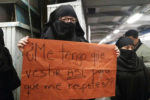Wiam Wahhab is the leader of the Tawhid Movement in Lebanon. A former MP and journalist, he is also a close ally of Syria. In a rant against Syria’s rival, Saudi Arabia, Wahhab compared Saudi women to “garbage bags,” in reference to the black niqab that is common in the country. Sparking the anger of protesters, Wahhab eventually retracted his statements, clarifying that his comments were not meant to insult the veil, but rather the lack of human rights afforded to women in Saudi Arabia.
While a follower of the Druze sect, Wahhab is still supported by Hezbollah. Therefore, this really isn’t a case of religious hatred as much as it is a case about politics. Wahhab has a reputation for being an unapologetic advocate for Syria. Therefore, it is not surprising that within the same speech, he also made attacks on the Wahhabi way of life, which is mostly tied to Saudi Arabia. His comments were in reference to a major anti-Hezbollah rally organised by the March 14th coalition, a pro-Saudi group. Thus, in light of Wahhab’s relationship with Hezbollah and Syria, his comments were not actually a comment on Muslim women, but rather a part of his own political agenda.
On the other side, those opposed to Wahhab used this opportunity to be outraged in support of the right of to wear a veil. Over 500 Sunni protesters in Tripoli gathered to express their outrage, and many organizations called for him to retract his statements.In this situation, there are two major things that aggravate me. First and foremost, this discussion and situation is not actually about the rights of Muslim women. This is about a man’s political agenda. While Wahhab may have cited concerns about human rights in Saudi Arabia, his primary concern, as with most political leaders, is with the interest of his party. Thus, he takes a page from George Bush’s book on feminism, and uses the image of poor and helpless Muslim women as a pawn in a campaign against his opponents.
However, his comments backfired, and now his opposition is speaking out against him in order to protect the veil. In fact, 70 Lebanese and Saudi women decided to file a lawsuit against him for inciting hatred against a religious group. Interestingly, the lawsuit also happens to call for the closure of the Tawhid Movement. Thus, protecting Muslim women is becoming a thinly veiled cover for a rather convoluted power play.
The second element that angers me involves the usage of “Muslim women’s rights” to justify a specific political stance. The rights of Muslim women are blatantly being used as a political pawn on both sides of the issue. Therefore, while Wahhab was using the rights of Muslim women to warn about the evils of absorbing more of Saudi culture in Lebanon, his opposition was utilizing the “protection” of religious rights in order to crush him. Such self-righteous pleas are thrown around in the name of protecting the veil and “protecting women’s rights” against allegedly hateful and abusive authorities. Both scenarios treat women as a homogenous group that needs protection. In actuality, these conversations are not about addressing human rights violations against Muslim women. That is what is most insulting about this conversation.
While I do feel that Wahhab’s comments were in poor taste, I think it is important to note the political context of this incident. If this were truly about inciting religious hatred, then the teams would be clearly drawn, as many of the parties involved are a part of large religious groups in Lebanon. I am just tired of the rights of Muslim women being utilized as a tactic, rather than being discussed as an actual point of a platform.


